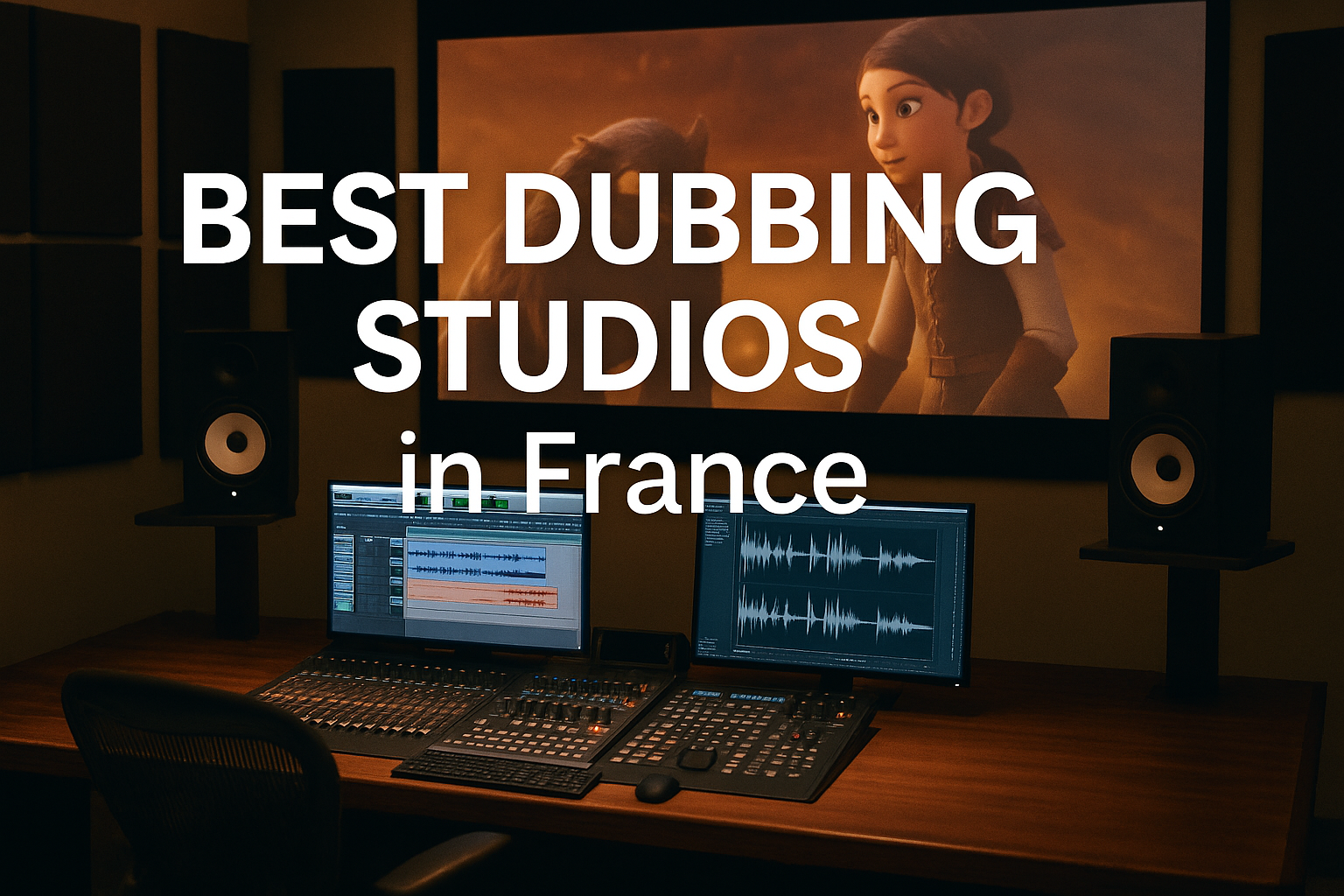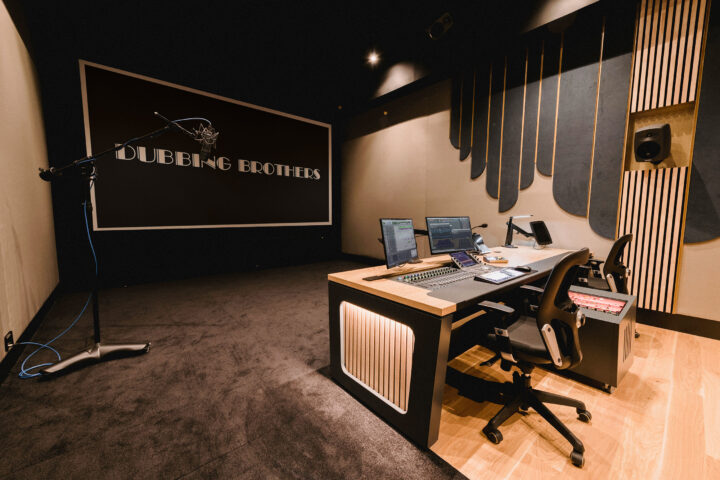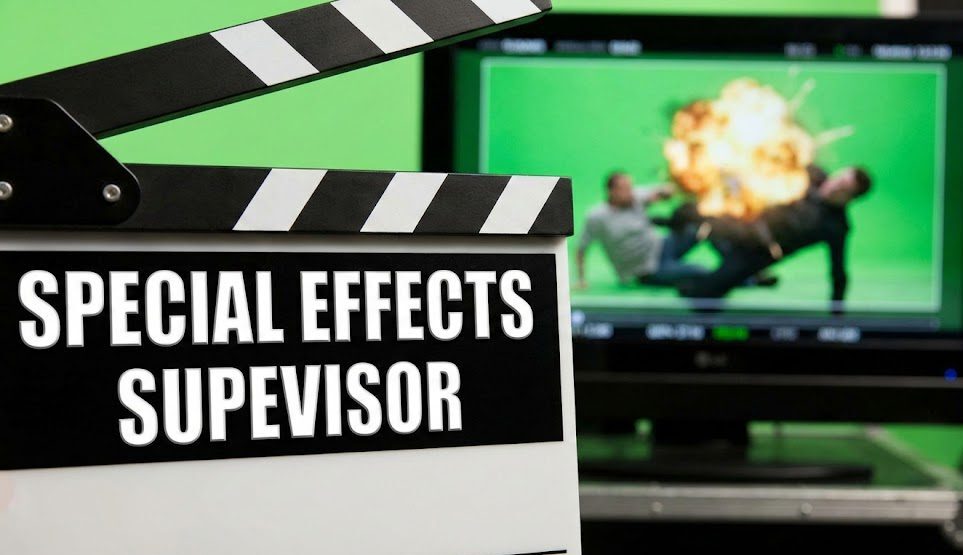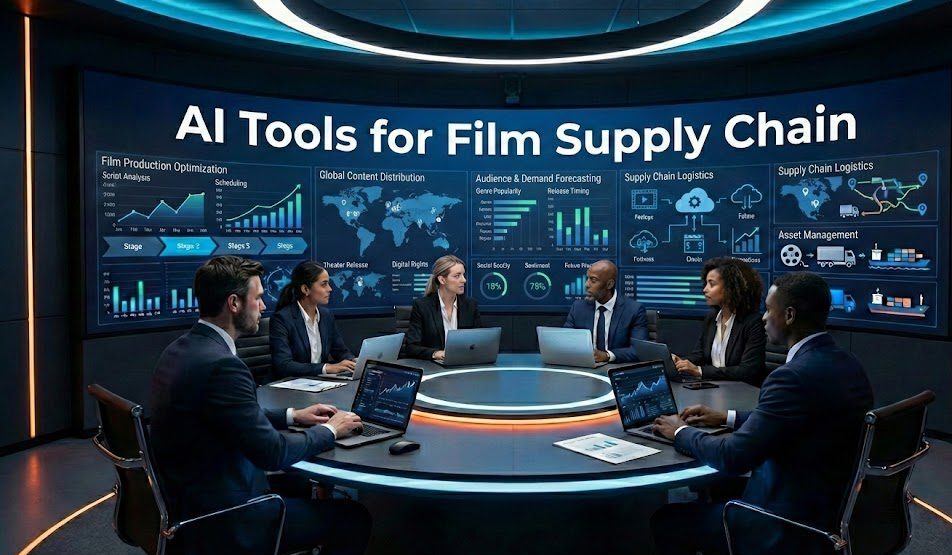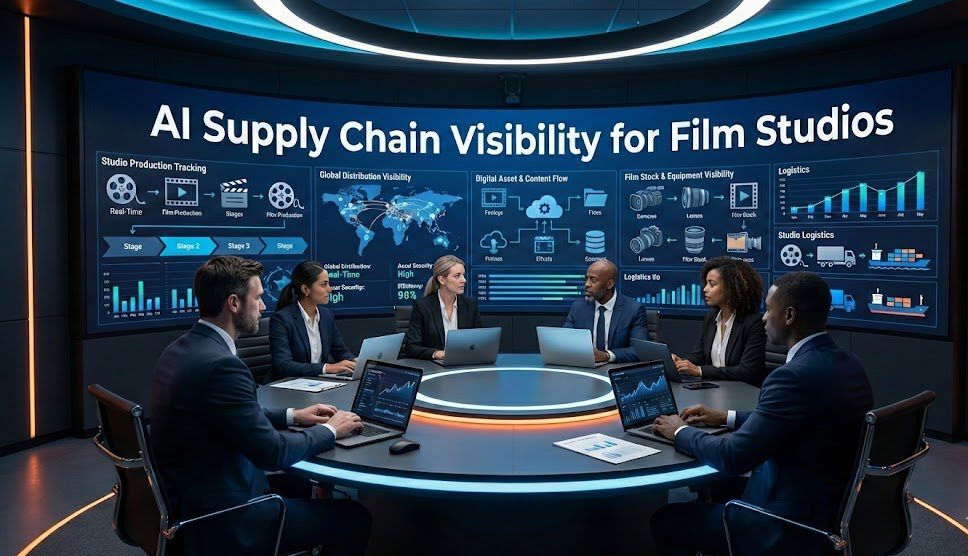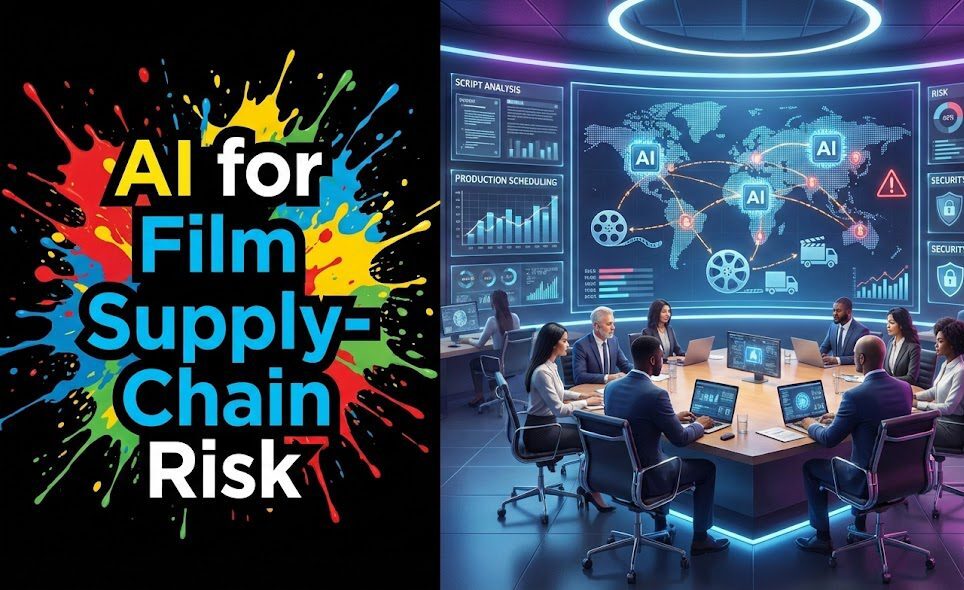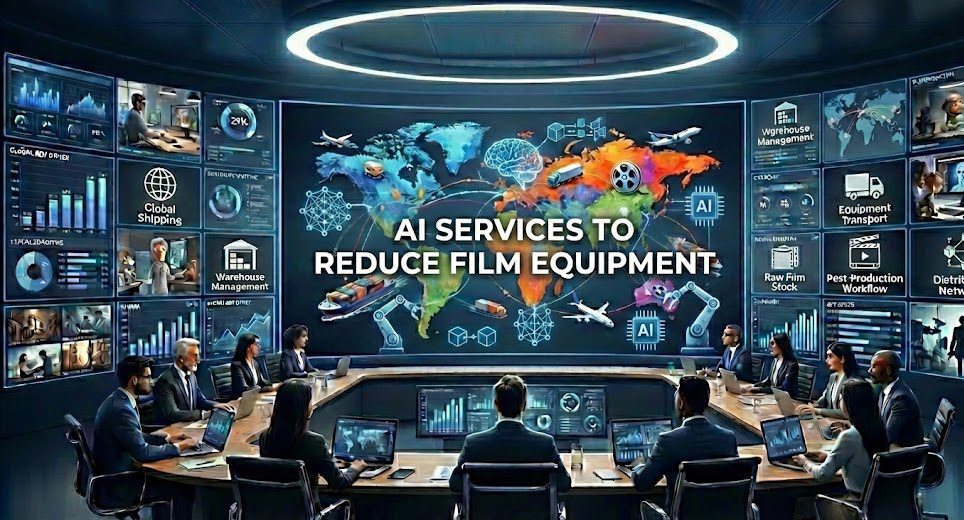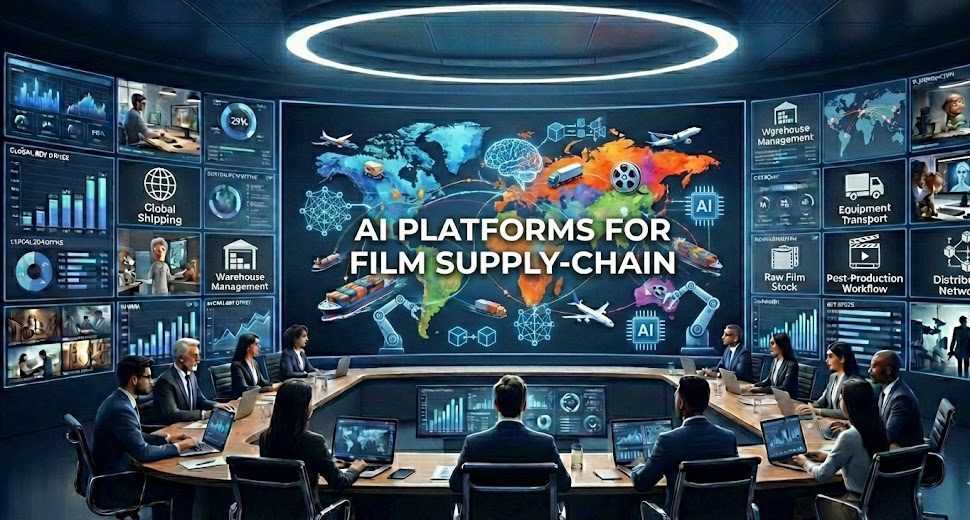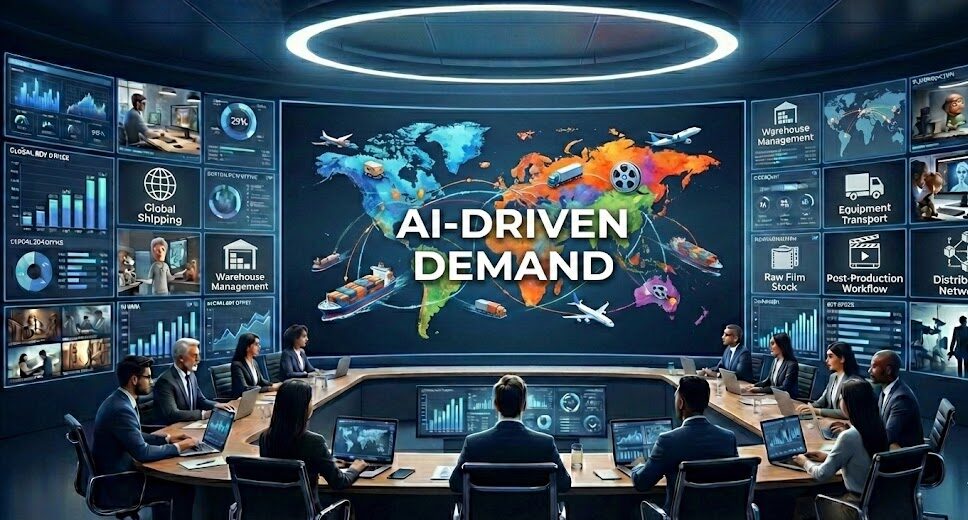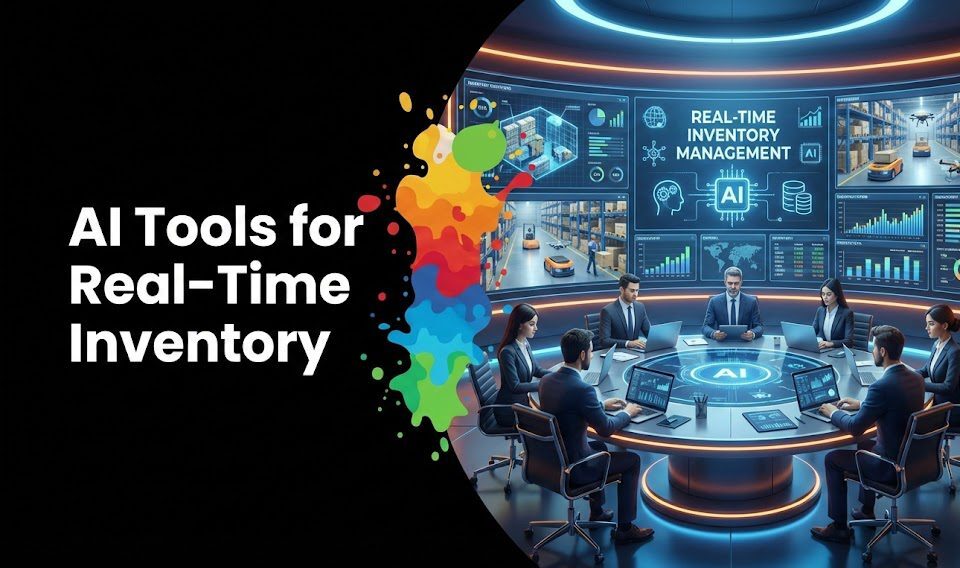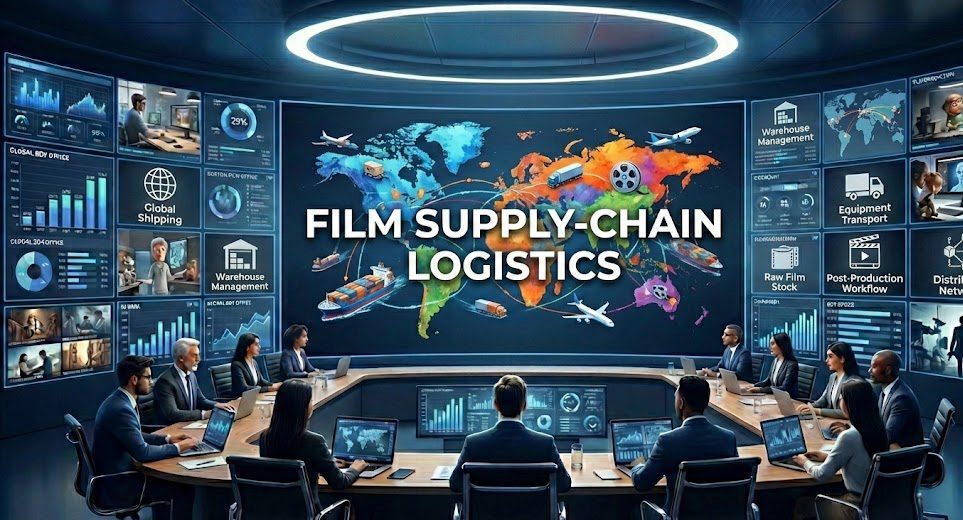Introduction
Hey there, content creators and distributors! Are you looking to break into the vibrant French market? Well, you’ve come to the right place! Finding high-quality dubbing studios in France is a crucial step to make sure your amazing films and TV shows truly connect with French-speaking audiences. The French are known for their love of well-dubbed content, so getting it right is super important. This article will guide you through the landscape of French dubbing, show you what to look for in a studio, and highlight some of the key players in the industry. We’ll explore everything from the importance of cultural nuance to the latest tech in voice recording. Let’s dive in and find the perfect French voice for your project!
Table of content
- Introduction
- Key-Takeaways
- Understanding the French Dubbing Landscape and the Importance of Quality Dubbing Studios in France
- Key Factors in Choosing Dubbing Studios in France
- Spotlight on Leading French Dubbing Studios
- The Dubbing Process: From Script to Screen
- The Future of Dubbing in France and Emerging Trends
- How Vitrina Supports Your Search for Dubbing Studios in France
- Conclusion
- FAQs
Key Takeaways
| Aspect | Insight |
|---|---|
| Market Significance | France has a strong preference for dubbed content, making high-quality dubbing essential for market entry. |
| Key Studio Criteria | Look for experience, talent pool, technical capabilities, and understanding of cultural nuances. |
| Major Players | Several established studios offer a range of dubbing and localization services. |
| Cultural Adaptation | Beyond literal translation, adapting humor, emotion, and cultural references is key. |
| Technological Advancements | Top studios utilize advanced recording technology and may incorporate AI for efficiency. |
| Vitrina’s Role | Vitrina can help you connect with verified dubbing studios and manage your localization projects. |
Want to Ensure Your Film Succeeds in France?

Understanding the French Dubbing Landscape and the Importance of Quality Dubbing Studios in France
France has a long and proud tradition of film and television, and with that comes a strong preference for dubbed content over subtitles, especially for mainstream movies and TV series. This isn’t just a casual preference; it’s deeply ingrained in their viewing culture. When international content is released in France, audiences expect a seamless experience where the French voices feel natural and authentic to the characters. This is why partnering with reputable dubbing studios in France is not just a good idea, it’s essential for success. Poor dubbing can lead to a disconnect with the audience, negative reviews, and ultimately, lower viewership. It’s all about preserving the original intent and emotion of the content while making it accessible and enjoyable for a French-speaking audience. Think about it – a joke that lands perfectly in English might fall flat if translated literally. A skilled dubbing studio understands these nuances.
What makes the French dubbing market unique?
The French dubbing market is unique due to its high standards and the discerning nature of its audience. Unlike some countries where subtitles are more common for foreign films, France has a strong infrastructure and talent pool dedicated to “Version Française” (VF). This means there’s a wealth of experienced voice actors, directors, and sound engineers who specialize in dubbing. Furthermore, there are specific cultural expectations; for example, the synchronization (lip-sync) quality is often scrutinized, and the choice of voice actors can significantly impact a film’s reception. The industry also has strong unions and guilds that ensure quality and fair practices, contributing to the overall professionalism of dubbing studios in France.
Why is high-quality dubbing crucial for the French audience?
High-quality dubbing is crucial because French audiences have grown accustomed to it and expect it. A well-dubbed film or series allows viewers to fully immerse themselves in the story without the distraction of reading subtitles or struggling with a foreign language. It makes international content feel local and relatable. For content creators, this means your story’s emotional impact, humor, and dramatic tension are preserved. If the dubbing is off—be it poor lip-sync, mismatched voices, or awkward translations—it can pull the viewer right out of the experience. This is particularly true for children’s programming and animated content, where clear and engaging voice work is paramount. Investing in top-tier dubbing studios in France ensures your content resonates effectively.
What are common pitfalls to avoid in French dubbing?
One common pitfall is choosing a studio based solely on price, which can lead to compromised quality. Cheap dubbing often means inexperienced talent, rushed production, and poor technical execution. Another mistake is a literal translation that fails to capture cultural nuances, idioms, or humor appropriately. This can make the dialogue sound unnatural or even nonsensical. For instance, a culturally specific joke might need to be adapted or replaced with an equivalent French one. Also, poor lip-synchronization is a major issue; if the actors’ mouth movements don’t match the French dialogue, it’s incredibly jarring for viewers. Finally, miscasting voice actors—voices that don’t suit the characters’ age, personality, or on-screen presence—can seriously undermine the credibility of the dub. Quality dubbing studios in France will have robust quality control processes to avoid these issues.
| Challenge | Why It’s a Problem | Solution |
|---|---|---|
| Literal Translation | Loses cultural nuance and humor. | Employ skilled translators and adaptors who understand both cultures. |
| Poor Lip-Sync | Visually distracting and immersion-breaking. | Use experienced directors and meticulous timing. |
| Voice Miscasting | Characters feel inauthentic. | Careful voice casting considering original actor and character traits. |
| Inconsistent Quality | Uneven viewing experience. | Strong quality control throughout the process. |
- The French market has a strong preference for dubbed content.
- Quality is paramount for audience acceptance.
- Cultural adaptation is as important as linguistic accuracy.
- Experienced dubbing studios in France understand these local market demands.
Key Factors in Choosing Dubbing Studios in France
Alright, so you know you need great dubbing. But how do you pick the right partner from the many dubbing studios in France? It’s not just about finding someone who can translate words; it’s about finding a team that can bring your story to life in a new language. You’ll want to look at their track record – have they worked on projects similar to yours? Do they have a deep roster of talented voice actors who can capture the essence of your characters? And what about their tech setup? Modern dubbing requires top-notch recording gear and sound engineering skills. Don’t forget about project management either; a well-organized studio will make the whole process smoother and ensure deadlines are met. It’s a bit like casting for a new movie – you need the right talent and the right team behind the scenes.
What experience and portfolio should I look for?
When evaluating dubbing studios in France, look for a robust portfolio that showcases a variety of genres and project types. Have they handled big blockbuster films, popular TV series, animation, or documentaries? Experience with content similar to yours is a big plus, as they’ll understand the specific stylistic and tonal requirements. Check for client testimonials or references. Reputable studios will be proud to share their past work and the names of clients they’ve worked with. A studio that has been in the business for a while and has a history of successful projects, like Dubbing Brothers or Hiventy, often indicates reliability and quality.
How important is the studio’s talent pool of voice actors and directors?
Extremely important! The quality of the voice actors and the skill of the dubbing director are perhaps the most critical factors. A good studio will have access to a wide range of professional French voice actors – from seasoned veterans who are household names in French dubbing to fresh new talent. They should be able to provide voice samples and help you cast actors whose voices and delivery style match your original characters. The dubbing director plays a pivotal role in guiding the actors, ensuring accurate lip-sync, consistent performances, and capturing the right emotional tone. Look for studios that work with experienced directors who have a keen ear for performance and a deep understanding of storytelling. Many prominent dubbing studios in France pride themselves on their curated network of talent.
What technical capabilities and facilities are essential?
Modern dubbing requires state-of-the-art technical facilities. This includes acoustically treated recording studios (booths), high-quality microphones, mixing consoles, and industry-standard audio software like Pro Tools. The studio should be capable of delivering audio in various formats required for different platforms (theatrical, broadcast, streaming). Ask about their quality control processes for sound engineering, mixing, and mastering. Do they offer 5.1 surround sound mixing if your project requires it? Reliable data security and backup systems are also crucial, especially when dealing with sensitive pre-release content. Studios like Cinekita often highlight their technical prowess.
How do studios handle cultural adaptation and localization?
This is where the artistry of dubbing truly shines. The best dubbing studios in France don’t just translate; they localize. This means adapting dialogue, humor, cultural references, and even character names (though less common for names) to make sense and resonate with a French audience. Their team should include skilled translators and adaptors who are not only bilingual but also bicultural. They need to understand the subtleties of both the source language and French culture. Ask potential studios about their process for script adaptation and how they ensure cultural appropriateness. Do they consult with cultural experts if needed? This deep level of localization is what separates an okay dub from a great one.
| Factor | Why It Matters | What to Ask |
|---|---|---|
| Experience & Portfolio | Indicates reliability and understanding of different genres. | “Can I see examples of similar projects you’ve dubbed?” |
| Talent Pool | Quality of voice actors and directors defines the final product. | “How do you select voice actors and directors for a project?” |
| Technical Capabilities | Ensures high-quality sound and delivery. | “What recording technology and mixing capabilities do you have?” |
| Cultural Adaptation | Crucial for audience connection and relatability. | “What is your process for script adaptation and ensuring cultural relevance?” |
- Prioritize studios with a proven track record in your genre.
- A deep and diverse talent pool is non-negotiable.
- Ensure the studio has modern, high-quality technical facilities.
- Inquire deeply about their approach to cultural adaptation – it’s more than just translation.
Spotlight on Leading French Dubbing Studios
France is home to some world-class dubbing facilities, known for their exceptional quality and long history in the business. These aren’t just buildings with microphones; they are creative hubs filled with talented artists and technicians dedicated to the art of voice. When you’re looking for dubbing studios in France, a few names often come up due to their reputation and extensive work with major international clients. These studios have typically invested heavily in both talent and technology, ensuring they can handle complex projects and deliver results that meet the high expectations of the French market. Let’s take a peek at some of the companies making waves.
Who are some of the most reputable dubbing companies in France?
Several companies stand out in the French dubbing scene. For instance, Dubbing Brothers is a major international player with significant operations in France, known for handling big Hollywood blockbusters. Hiventy (formerly LVT, Ramses, and Monal Group) is another giant, offering a comprehensive range of services including dubbing, subtitling, and post-production. Smaller, specialized studios also thrive, sometimes focusing on specific niches like animation or arthouse films. Others you might encounter include EVA France ST, Imagine, Cinekita, Karina Films, Cinephase, and Badje Studios. Each of these dubbing studios in France has its own strengths and specializations.
What are the specializations of different top-tier studios?
Different studios may specialize in various areas. Some, like the larger entities, are equipped to handle high-volume television series and major theatrical releases, offering end-to-end localization packages. Others might be renowned for their work in animation, requiring specific skills in voice acting for animated characters and often involving song dubbing. For example, a studio like Imagine might have a strong portfolio in children’s content. Some studios might focus on dubbing for streaming platforms like Netflix or Amazon Prime Video, which have particular technical delivery specifications. Arthouse film distributors might prefer studios known for their subtle and artistic approach to dubbing. When researching dubbing studios in France, consider their client list and the types of projects they frequently handle to see if it aligns with your needs.
How do these studios compare in terms of scale and services offered?
The scale and services can vary significantly. Large, integrated studios like Dubbing Brothers or Hiventy often have multiple recording studios, extensive in-house teams (project managers, sound engineers, translators), and can offer a full suite of localization services including subtitling, audio description, and access services. They are geared for large-scale projects with tight deadlines. Boutique studios, while smaller, might offer a more personalized service and could be specialists in a particular niche. For example, Badje Studios might offer a more focused approach. The choice depends on your project’s size, budget, and specific requirements. It’s always a good idea to explore options through platforms like Vitrina to compare these dubbing studios in France.
| Studio Example (Illustrative) | Potential Specialization | Typical Scale |
|---|---|---|
| Dubbing Brothers | Major theatrical releases, high-volume TV series | Large, international |
| Hiventy | Comprehensive localization (dubbing, subtitling, post-production) | Large, multi-service |
| Imagine | Animation, children’s content | Medium to Large |
| Boutique Studio (General) | Niche genres, personalized service | Small to Medium |
- Research studios based on their reputation and client work. Some key names include Dubbing Brothers, Hiventy, and Cinekita.
- Consider the studio’s specialization – animation, live-action, documentaries, etc.
- Compare scale: large studios for volume, boutique studios for specialized attention.
- Many quality dubbing studios in France are members of industry associations.
Unlock the French Market with Perfect Dubbing?

The Dubbing Process: From Script to Screen
Ever wonder how your favorite English-speaking actor suddenly starts spouting perfect French? It’s quite a journey! The dubbing process at professional dubbing studios in France is a carefully orchestrated series of steps, much more complex than just reading lines into a microphone. It starts way before any actor steps into the booth, with meticulous script adaptation, and continues through casting, recording, and detailed sound mixing. Each stage requires specialized skills and a keen eye (and ear!) for detail to ensure the final French version feels as natural and engaging as the original. It’s a blend of technical precision and artistic interpretation, all aimed at creating a seamless experience for the French audience.
What are the typical steps involved in a French dubbing project?
The process usually begins with script translation and adaptation. This isn’t just a word-for-word translation; the script is adapted for lip-sync, timing, and cultural relevance. Next comes voice casting, where appropriate French voice actors are selected for each character. This is followed by the recording sessions, where voice actors perform their lines under the guidance of a dubbing director, watching the original video for timing and emotion. After recording, the audio tracks go into editing and mixing. Here, the dialogue is synchronized perfectly with the on-screen actors’ lip movements, sound effects are balanced, and the overall soundscape is created. Finally, there’s a quality control (QC) phase to catch any errors before the final dubbed version is delivered. All proficient dubbing studios in France follow a similar structured workflow.
How long does the dubbing process usually take for a feature film or TV series episode?
The timeline can vary greatly depending on several factors: the length of the content (a 90-minute film vs. a 22-minute TV episode), the density of dialogue, the number of characters, and the complexity of the audio (e.g., action scenes with lots of sound effects vs. dialogue-heavy dramas). For a feature film, the dubbing process, from script adaptation to final mix, can take anywhere from 4 to 8 weeks, sometimes longer for very complex projects. For a single TV series episode (e.g., 45-60 minutes), it might take 1 to 2 weeks. High-volume series often have streamlined workflows to manage tighter turnaround times. Reputable dubbing studios in France will provide a realistic schedule based on your project’s specifics.
What role does technology play in modern dubbing studios?
Technology is absolutely central to modern dubbing. This includes:
- Digital Audio Workstations (DAWs): Software like Pro Tools is the industry standard for recording, editing, and mixing.
- Automated Dialogue Replacement (ADR) tools: While traditionally for re-recording original dialogue, similar tech aids in precise lip-sync for dubbing.
- High-quality microphones and preamps: Essential for capturing clean, professional-grade voice recordings.
- Acoustically treated recording booths: To eliminate external noise and ensure pristine audio.
- Cloud-based collaboration tools: Allowing for remote reviews, approvals, and talent participation, which many dubbing studios in France have adopted.
- AI-assisted tools: Emerging technologies for tasks like initial script timing, QC, or even synthetic voice generation for pre-visualization, though artistic human oversight remains key.
Studios like Cinephase and others continuously invest in the latest tech to improve efficiency and quality.
| Dubbing Stage | Key Activities | Primary Goal |
|---|---|---|
| Script Adaptation | Translation, lip-sync adaptation, cultural localization. | Create a natural-sounding and culturally relevant French script. |
| Voice Casting | Selecting voice actors based on character profile and original voice. | Find the perfect French voices for all characters. |
| Recording | Voice actors perform lines under director’s guidance. | Capture high-quality, emotionally accurate vocal performances. |
| Mixing & Editing | Dialogue sync, sound effects, music balancing, final mix. | Create a seamless and immersive French audio track. |
| Quality Control | Review of sync, performance, technical specs. | Ensure a flawless final product. |
- The dubbing process is multi-staged, requiring diverse expertise.
- Timelines vary based on project length and complexity.
- Technology, from DAWs to AI-assisted tools, is integral to modern dubbing studios in France.
- Quality control at each step is vital for a polished final product.
The Future of Dubbing in France and Emerging Trends
The world of dubbing is always on the move, and dubbing studios in France are right there, adapting and innovating. Just like in other parts of the entertainment industry, technology is a big driver of change. We’re seeing new tools and techniques pop up that can make the process faster or offer new creative possibilities. At the same time, the way we watch movies and shows is changing too, with streaming services bringing a flood of international content that all needs a good French voice. This means more work, but also more pressure to deliver high quality quickly. It’s an exciting time, with challenges and opportunities shaping what’s next for French dubbing.
How is AI and machine learning impacting French dubbing?
Artificial Intelligence (AI) and Machine Learning (ML) are definitely making inroads. We’re seeing AI being used for tasks like:
- Automated Script Timing: AI can help quickly break down scripts and align them with video for initial timing, saving human adaptors time.
- Quality Control (QC): AI tools can scan for technical issues like sync errors or audio glitches.
- Synthetic Voices/Text-to-Speech (TTS): While still not quite ready to replace human actors for final high-quality dubs (especially in a discerning market like France), AI-generated voices are being used for scratch tracks, pre-visualization, or less prominent content. Some dubbing studios in France are exploring these tools.
- Voice Cloning: The ability to replicate an actor’s voice in another language is advancing, though ethical and quality considerations are significant.
However, the creative and nuanced aspects of voice acting and script adaptation still heavily rely on human talent, especially for maintaining the high artistic standards expected in France.
What are the trends in demand for dubbed content in France?
The demand for dubbed content in France remains incredibly strong and is arguably growing. Several factors contribute to this:
- Rise of Streaming Platforms: Global streamers like Netflix, Amazon Prime Video, and Disney+ are investing heavily in localizing their vast libraries for the French market. This means a constant stream of series and films needing dubbing.
- Globalization of Content: More content from diverse countries (e.g., K-dramas, Nordic noir) is gaining international popularity, and French audiences want to access it in their own language.
- Gaming Industry: The video game industry also requires extensive dubbing for the French market, which often involves complex interactive narratives.
This sustained demand puts pressure on dubbing studios in France to maintain capacity and efficiency while upholding quality.
Are there new business models or services emerging from dubbing studios?
Yes, some new models and services are emerging. For instance:
- Remote Dubbing Solutions: Accelerated by the pandemic, many studios have refined workflows that allow for remote recording and collaboration, giving access to a wider talent pool.
- End-to-End Localization Packages: Studios are increasingly offering a one-stop-shop for all localization needs – dubbing, subtitling, audio description, accessibility services, and even mastering for different platforms.
- Faster Turnaround Services: For certain types of content (e.g., news, fast-paced online content), studios are developing workflows for quicker dubbing, sometimes leveraging AI for initial steps.
- Consultancy Services: Some dubbing studios in France are offering more strategic advice to content creators on how to best approach localization for the French market, going beyond just the technical execution.
Companies like Karina Films and Badje Studios are likely adapting to these evolving industry demands.
| Trend | Description | Impact on Studios |
|---|---|---|
| AI Integration | Use of AI for timing, QC, scratch voices. | Potential for increased efficiency, but human talent remains crucial for quality. |
| Increased Demand (Streaming) | More content requiring dubbing due to global streaming services. | Higher volume of work, need for scalable solutions. |
| Remote Workflows | Adoption of remote recording and collaboration tools. | Wider talent access, operational flexibility. |
| Holistic Service Offerings | Studios providing comprehensive localization packages. | Opportunity to become a one-stop solution for clients. |
- AI is a tool, not a replacement for human talent in high-quality French dubbing.
- Demand for dubbed content is robust, driven by streaming and global content flow.
- Dubbing studios in France are adopting new technologies and service models to stay competitive.
- The core value of artistic and cultural adaptation remains paramount.
How Vitrina Supports Your Search for Dubbing Studios in France
Finding the right creative partners in a global market can be a real puzzle. That’s where Vitrina comes in to simplify your search for top-notch dubbing studios in France. Our platform is designed to connect buyers of creative services, like you, with a vast network of verified vendors. Instead of spending countless hours sifting through search results and trying to vet studios one by one, Vitrina offers a streamlined way to discover, evaluate, and connect with the best talent the French dubbing industry has to offer. We understand the nuances of the media supply chain and aim to make your procurement process more efficient and effective. Think of us as your expert guide to the global entertainment ecosystem!
With Vitrina, you can easily filter and search for dubbing studios in France based on their specializations, past projects, client reviews, and technical capabilities. Our platform provides detailed profiles of studios, including links to their work and information on their key personnel. This allows you to quickly create a shortlist of potential partners that align with your project’s specific needs and budget. Furthermore, Vitrina’s Film+TV Projects Tracker can give you insights into which studios are working on current or upcoming projects, indicating their capacity and current industry engagement. By leveraging our comprehensive database and industry intelligence, you can make more informed decisions and find reliable dubbing studios in France, like EVA France ST or Imagine, with greater confidence and less hassle. Our goal is to foster transparent and successful collaborations within the global entertainment supply chain, helping your content shine in the French market.
Conclusion
So there you have it! Navigating the world of dubbing studios in France might seem a bit daunting at first, but by focusing on quality, experience, cultural fit, and technical prowess, you can find the perfect partner to bring your content to the discerning French audience. Remember, in France, dubbing isn’t just a technicality; it’s an art form that significantly impacts how your story is received. From understanding the market’s unique demands to exploring the capabilities of studios like Dubbing Brothers or Hiventy, making an informed choice is key.
Choosing the right studio means your message will resonate authentically, your characters will connect, and your project will have the best possible chance of success in this important European market. And don’t forget, platforms like Vitrina are here to help you make those connections seamlessly.
Ready to find the perfect French voice for your masterpiece? Explore Vitrina today and connect with leading dubbing studios in France!
Frequently Asked Questions
The cost can vary widely based on factors like the number of voices, complexity of the script, length of the film, and the renown of the chosen voice actors and studio. It can range from tens of thousands to over a hundred thousand euros for a high-quality dub from leading dubbing studios in France. It’s best to get custom quotes based on your project.
Union presence (like the SFA – Syndicat Français des Artistes-interprètes) is quite strong in France. Working with union talent often ensures a high level of professionalism and experience. Many top dubbing studios in France primarily work with union actors, which can affect costs but generally guarantees quality.
Yes, most reputable dubbing studios in France will involve you in the voice casting process. They will typically provide you with voice samples (demos) of potential actors for key roles and allow you to have final approval, often in consultation with the dubbing director.
In France, “doublage” (dubbing) specifically refers to replacing the original dialogue with French dialogue that is lip-synchronized to the on-screen actors. “Voice-over” is more often used for narration (like in documentaries) or when a single voice speaks over the original audio, which is kept at a lower volume. For films and TV series, full lip-sync dubbing is the standard expected by French audiences when choosing dubbing studios in France.


